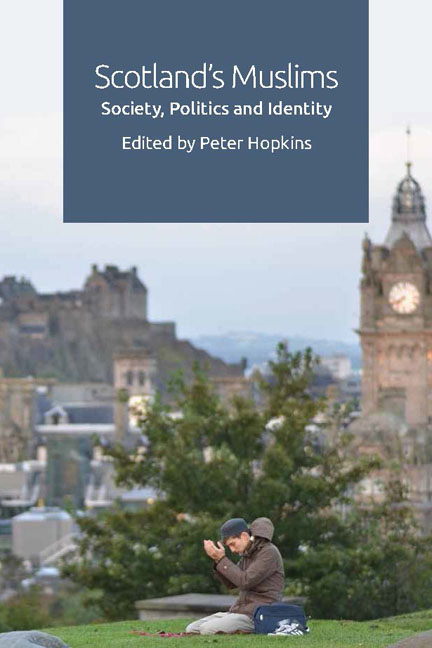Book contents
- Frontmatter
- Contents
- List of Figures and Tables
- Acknowledgements
- Notes on the Contributors
- 1 Introduction Scotland's Muslims: Early Settlement, Current Context and Research Themes
- 2 Health The Health Profile of Muslims in Scotland
- 3 Education Educational Outcomes of Muslim Pupils in Scotland and Parents' Mobilisation of Different Forms of Capital
- 4 Political Participation Young Muslims' Political Interests and Political Participation in Scotland
- 5 Gender and Migration The Role of the ‘Other’ Woman in Shaping the Subjectivities of Recent Muslim Migrant Women to Scotland
- 6 Sexuality Scottish Muslim Gay Men and the Troubling Intersection of Sexuality and Religion
- 7 Young People Muslim Youth in Scotland: Politics, Identity and Multicultural Citizenship
- 8 Generational Relations Gender and Generational Relations for Muslim Women in Scotland
- 9 Heritage Feeling Scottish and Being Muslim: Findings from the Colourful Heritage Project
- 10 Multiculturalism Multiculturalism and Scotland: ‘Bringing the Outside into the Middle’
- 11 Media Muslim Engagement with the Mainstream Media in a Scottish Context
- 12 Representation Representing Islam at the Edinburgh International Book Festival
- 13 Integration Halal Scots: Muslims' Social Integration in Scotland
- Index
10 - Multiculturalism Multiculturalism and Scotland: ‘Bringing the Outside into the Middle’
Published online by Cambridge University Press: 23 June 2018
- Frontmatter
- Contents
- List of Figures and Tables
- Acknowledgements
- Notes on the Contributors
- 1 Introduction Scotland's Muslims: Early Settlement, Current Context and Research Themes
- 2 Health The Health Profile of Muslims in Scotland
- 3 Education Educational Outcomes of Muslim Pupils in Scotland and Parents' Mobilisation of Different Forms of Capital
- 4 Political Participation Young Muslims' Political Interests and Political Participation in Scotland
- 5 Gender and Migration The Role of the ‘Other’ Woman in Shaping the Subjectivities of Recent Muslim Migrant Women to Scotland
- 6 Sexuality Scottish Muslim Gay Men and the Troubling Intersection of Sexuality and Religion
- 7 Young People Muslim Youth in Scotland: Politics, Identity and Multicultural Citizenship
- 8 Generational Relations Gender and Generational Relations for Muslim Women in Scotland
- 9 Heritage Feeling Scottish and Being Muslim: Findings from the Colourful Heritage Project
- 10 Multiculturalism Multiculturalism and Scotland: ‘Bringing the Outside into the Middle’
- 11 Media Muslim Engagement with the Mainstream Media in a Scottish Context
- 12 Representation Representing Islam at the Edinburgh International Book Festival
- 13 Integration Halal Scots: Muslims' Social Integration in Scotland
- Index
Summary
INTRODUCTION
The purpose of this chapter is to locate the discussion about Muslims in Scotland in relation to questions of national identity and multicultural citizenship. While the former has certainly been a prominent feature of public and policy debate, the latter has largely been overshadowed by constitutional questions raised by devolution and the referenda on independence. This means that, while we have undoubtedly progressed since MacEwen (1980) characterised the treatment of ‘race-relations’ in Scotland as a matter either of ‘ignorance or apathy’, the issue of where ethnic, racial and religious minorities rest in the contemporary landscape remains unsettled.
One of the core arguments of this chapter is that these issues are all interrelated, and that the present and future status of Muslims in Scotland is tied up with wider debates about the ‘national question’. Hitherto, however, study of national identity in Scotland has often (though not always) been discussed in relation to the national identities of England, Wales and Britain as a whole. In this respect, national identity debates in Scotland have not predominantly been about how Muslim and other non-Christian religious minorities might remake common membership. As such we do not really know whether – in the late Stuart Hall's terms – Scotland has ‘re-written the margin into the centre, bringing the outside into the middle’ (Hall, 2005: 31). This is an unfortunate omission that this collection will help to redress. One of the conclusions of this chapter is that Muslims, as the largest non- Christian minority, can help to remake not only Scottish identities but also the identity of Scotland.
To explore this we need to take a step back and consider what the ‘national question’ comprises, in order that the rest of this collection can squarely focus on the contemporary status of Muslims in Scotland.
SCOTLAND, ‘SUB-STATE’ NATIONALISM AND MULTICULTURALISM
It is common to refer to Scotland as a ‘stateless nation’ (or, in David McCrone's term (2002), an ‘understated’ nation). Since the 1707 Acts of Union moved the Parliament to Westminster, Scotland has not had a sovereign or centralised administrative bureaucracy. This union, however, was only ever partial in that ‘it did not take away from Scotland any of the major institutions of civic life’ (Patterson, 2000: 46).
- Type
- Chapter
- Information
- Scotland's MuslimsSociety, Politics and Identity, pp. 198 - 217Publisher: Edinburgh University PressPrint publication year: 2017

